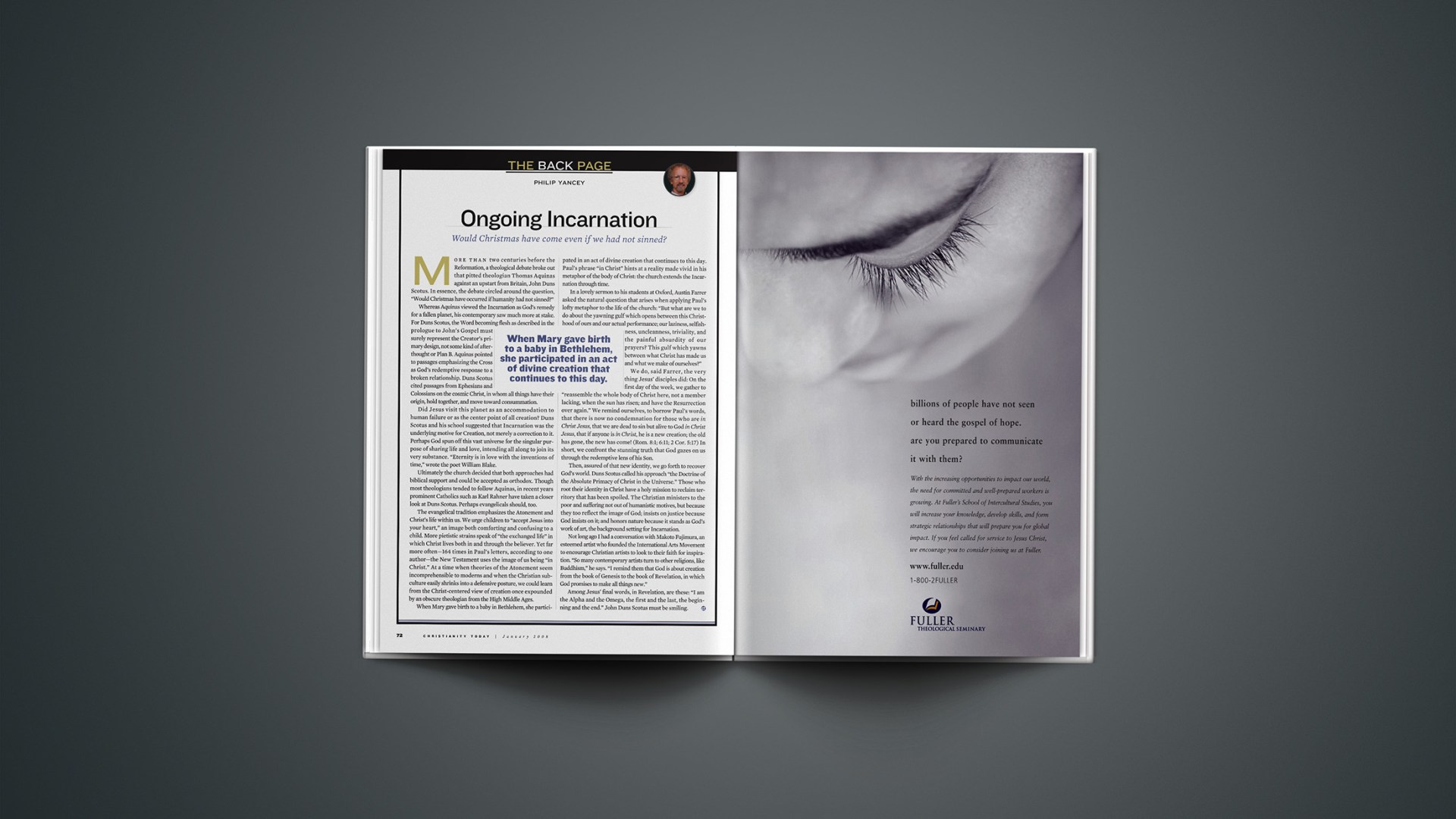More than two centuries before the Reformation, a theological debate broke out that pitted theologian Thomas Aquinas against an upstart from Britain, John Duns Scotus. In essence, the debate circled around the question, “Would Christmas have occurred if humanity had not sinned?”
Whereas Aquinas viewed the Incarnation as God’s remedy for a fallen planet, his contemporary saw much more at stake. For Duns Scotus, the Word becoming flesh as described in the prologue to John’s Gospel must surely represent the Creator’s primary design, not some kind of afterthought or Plan B. Aquinas pointed to passages emphasizing the Cross as God’s redemptive response to a broken relationship. Duns Scotus cited passages from Ephesians and Colossians on the cosmic Christ, in whom all things have their origin, hold together, and move toward consummation.
Did Jesus visit this planet as an accommodation to human failure or as the center point of all creation? Duns Scotus and his school suggested that Incarnation was the underlying motive for Creation, not merely a correction to it. Perhaps God spun off this vast universe for the singular purpose of sharing life and love, intending all along to join its very substance. “Eternity is in love with the inventions of time,” wrote the poet William Blake.
Ultimately the church decided that both approaches had biblical support and could be accepted as orthodox. Though most theologians tended to follow Aquinas, in recent years prominent Catholics such as Karl Rahner have taken a closer look at Duns Scotus. Perhaps evangelicals should, too.
The evangelical tradition emphasizes the Atonement and Christ’s life within us. We urge children to “accept Jesus into your heart,” an image both comforting and confusing to a child. More pietistic strains speak of “the exchanged life” in which Christ lives both in and through the believer. Yet far more often—164 times in Paul’s letters, according to one author—the New Testament uses the image of us being “in Christ.” At a time when theories of the Atonement seem incomprehensible to moderns and when the Christian subculture easily shrinks into a defensive posture, we could learn from the Christ-centered view of creation once expounded by an obscure theologian from the High Middle Ages.
When Mary gave birth to a baby in Bethlehem, she participated in an act of divine creation that continues to this day. Paul’s phrase “in Christ” hints at a reality made vivid in his metaphor of the body of Christ: the church extends the Incarnation through time.
In a lovely sermon to his students at Oxford, Austin Farrer asked the natural question that arises when applying Paul’s lofty metaphor to the life of the church: “But what are we to do about the yawning gulf which opens between this Christhood of ours and our actual performance; our laziness, selfishness, uncleanness, triviality, and the painful absurdity of our prayers? This gulf which yawns between what Christ has made us and what we make of ourselves?”
We do, said Farrer, the very thing Jesus’ disciples did: On the first day of the week, we gather to “reassemble the whole body of Christ here, not a member lacking, when the sun has risen; and have the Resurrection over again.” We remind ourselves, to borrow Paul’s words, that there is now no condemnation for those who are in Christ Jesus, that we are dead to sin but alive to God in Christ Jesus, that if anyone is in Christ, he is a new creation; the old has gone, the new has come! (Rom. 8:1; 6:11; 2 Cor. 5:17) In short, we confront the stunning truth that God gazes on us through the redemptive lens of his Son.
Then, assured of that new identity, we go forth to recover God’s world. Duns Scotus called his approach “the Doctrine of the Absolute Primacy of Christ in the Universe.” Those who root their identity in Christ have a holy mission to reclaim territory that has been spoiled. The Christian ministers to the poor and suffering not out of humanistic motives, but because they too reflect the image of God; insists on justice because God insists on it; and honors nature because it stands as God’s work of art, the background setting for Incarnation.
Not long ago I had a conversation with Makoto Fujimura, an esteemed artist who founded the International Arts Movement to encourage Christian artists to look to their faith for inspiration. “So many contemporary artists turn to other religions, like Buddhism,” he says. “I remind them that God is about creation from the book of Genesis to the book of Revelation, in which God promises to make all things new.”
Among Jesus’ final words, in Revelation, are these: “I am the Alpha and the Omega, the first and the last, the beginning and the end.” John Duns Scotus must be smiling.
Copyright © 2008 Christianity Today. Click for reprint information.
Related Elsewhere:
Yancey’s previous columns are available on our site.
Other articles on the Incarnation are in our Christmas section.










